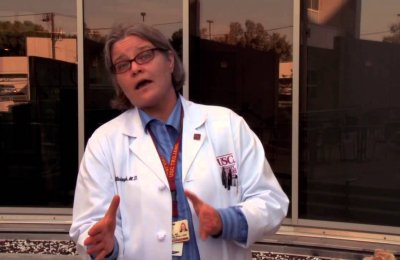In the coming months, a select group of journalists from news organizations across the country will publish in-depth reports on topics ranging from hospital errors to the connection between gun violence and children’s health.
Their reporting will come to life thanks to $53,500 in grants from the Dennis A. Hunt Fund for Health Journalism and the National Health Journalism Fellowships—both initiatives of USC Annenberg’s California Endowment Health Journalism Fellowships. The program pairs these journalists with senior fellows who, over nine months, brainstorm and share information and reporting tools. The 2011 National Fellows, who receive reporting grants ranging from $2,000 to $7,000, were competitively selected based upon the strength, ambition and reach of proposals that examined the intersection of community health, health policy and the nation’s growing diversity.
“We need high-quality, high-impact health journalism now more than ever to keep community health issues squarely in the public spotlight,” says Mary Lou Fulton, program manager for communication and media grants at The California Endowment, the Los Angeles-based health foundation that funds the USC Annenberg program.
Over the summer, the journalists gathered in Los Angeles for six days of workshops, seminars and field trips exploring community health issues. The fellowship program aims to broaden how reporters cover health and encourages the exploration of issues not traditionally considered part of the health beat. A day trip along the Los Angeles River focused on how the health of the river connects with the health of the residents living nearby. The trip got the journalists thinking about the health of the communities alongside the river, examining disparities in access to parkland for the city’s poorer residents and efforts to transform contaminated industrial sites along the river into open space. Other topics of discussion included violence prevention strategies for inner-city neighborhoods and the relationship between health and good urban design.
“We want people to come away with a different sense of what constitutes a health story,” says Michelle Levander, a veteran journalist and founding director of the fellowships. “We focus on health as it plays out in the community, as opposed to the medical research arena. We’re trying to broaden journalists’ perspective and encourage fellows to think critically about where ill health starts.”
The week in L.A. also focused on topical issues, including a story at the top of every health reporter’s mind—the prospects for President Obama’s health reform law. An expert panel explored constitutional challenges to the new law, state successes in implementing it and opponents’ efforts to thwart it. “We want journalists to return to their newsrooms and freelance careers with a notebook brimming with story ideas and a deeper understanding of complex policy issues of the day,” Levander says.
The program recruits extensively at ethnic media outlets and encourages mainstream-ethnic media collaborations; this year’s fellows work at organizations that serve African-American, Latino and Chinese readers.
For the health journalism fellows, the time spent brainstorming with other health journalists was, in itself, an invaluable experience. In breakout sessions, they swapped ideas on how to secure hospital records, create databases, mine statistics and persuade healthcare workers to talk on the record.
They discussed the limitations and challenges of each of their reporting projects and asked each other hard questions: “How are you going to humanize this?” and “How will you show readers why this is important to them?”
It’s the kind of collaboration that doesn’t happen often enough in many resource-strapped organizations, Levander says. “Reporters can feel very isolated, especially when they’re taking on a really ambitious project in today’s newsrooms.”
The time spent sharing ideas was one of the most helpful aspects of the program for Betsy Cliff, a fellow who’s been covering health in rural Oregon for seven years. “You hear journalists here saying, ‘I use this and that helped,’ and ‘what your story really needs is patient stories,’ and—at least at my news organization—journalists don’t do that very often,” Cliff says. “If they do, it’s a quick art planning meeting and someone’s racing to another interview. This really gives us an opportunity to put our heads together and help each other and use input from people of different news organizations, which is a fresh perspective.”
Cliff has reported on medical errors as part of her ongoing beat coverage, but will use the Fellowship’s guidance and grant money to take a deeper look at the causes of the errors and their effects. Besides funding overtime and travel for her project, the award is a signal to her editors that the story is worthy of a time commitment, she says.
The California Endowment Health Journalism Fellowships also are unique in the way they generate support from the reporters’ home newsrooms—they bring the fellows’ editors to Los Angeles for a day to join in the collaboration.
The stories produced by the fellowships over the years have had a broad impact, influencing legislation, garnering prestigious awards and prompting community conversations on important health topics. In two recent instances, National Health Journalism Fellowship projects prompted local foundations in Colorado and Missouri to give money to news outlets to fund several years of health reporting, Levander says. Since its inception in 2005, the partnership between USC Annenberg and The California Endowment has trained more than 500 journalists and new media producers.
The 2011 Dennis A Hunt fellows are Bill Graves, of The Oregonian; The Washington Post’s Sarah Kliff; Jeff Kelly Lowenstein, an editor at Hoy; Kate Long, who works for the Charleston Gazette and West Virginia Public Broadcasting; and freelance writers Janet Wilson and Bernice Yeung.
Also holding fellowships in 2011 are: Elizabeth Baier, of Minnesota Public Radio; Martha Bebinger of WBUR-FM in Boston; freelance reporter Kathryn Canavan; Betsy Cliff, a reporter at The Bulletin in Bend, Ore.; Sheree Crute; independent radio producer Philip Graitcer; Vicky Hallett of The Washington Post; Pamela K. Johnson of ABILITY Magazine; Caitlin Yoshiko Kandil of Boston’s Bay State Banner; The Dallas Morning News’ Ryan McNeill; the Tulsa World’s Shannon Muchmore; freelance writer Magaly Olivero; Marga Parés Arroyo of El Nuevo Dia; and Travis Pillow of the Florida Independent website.








